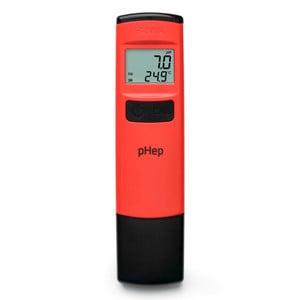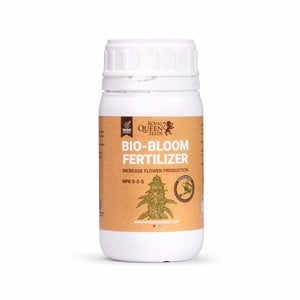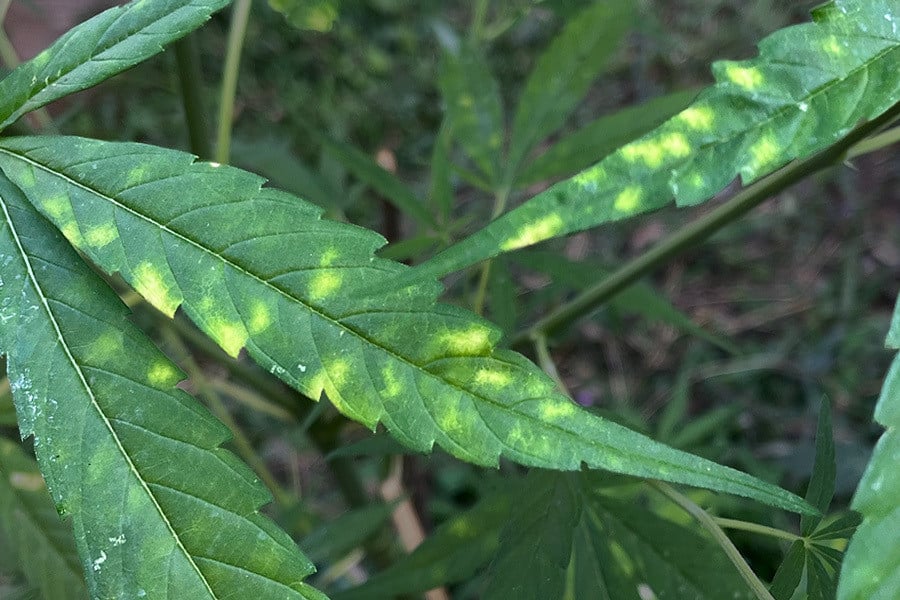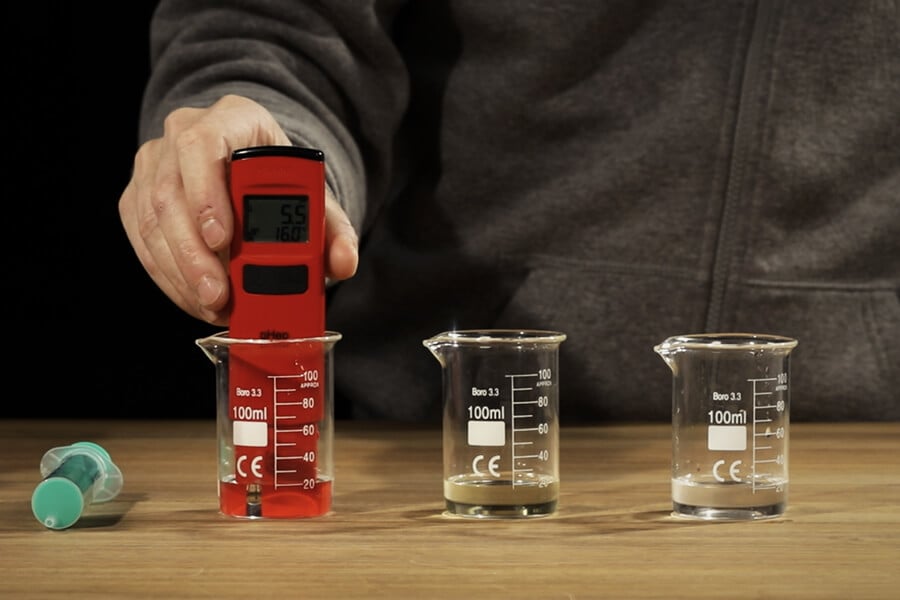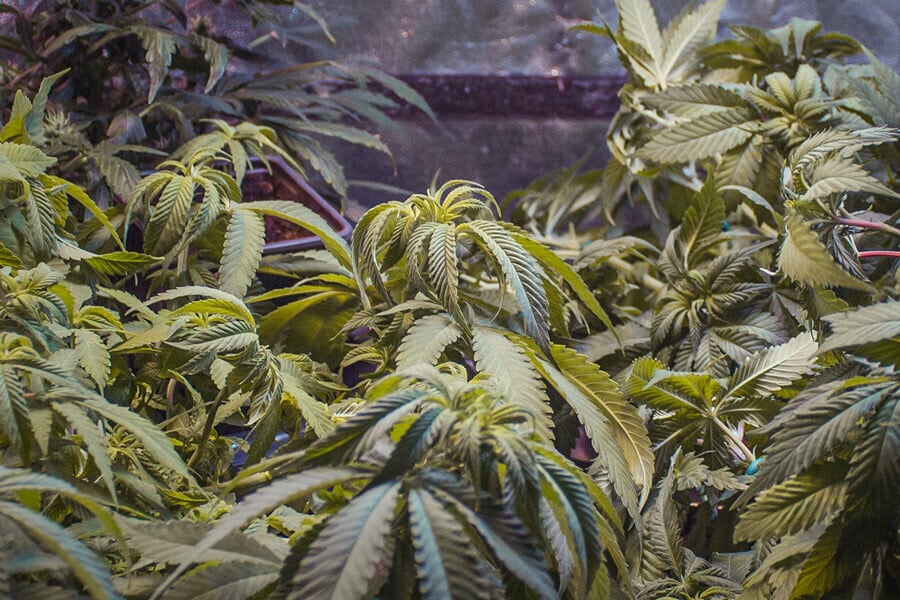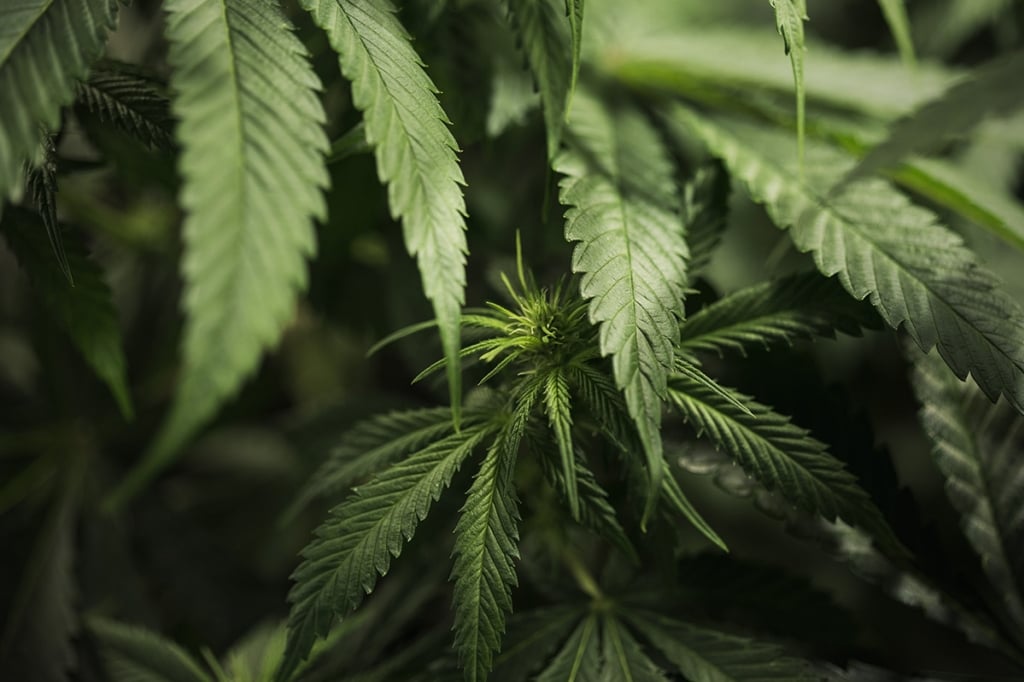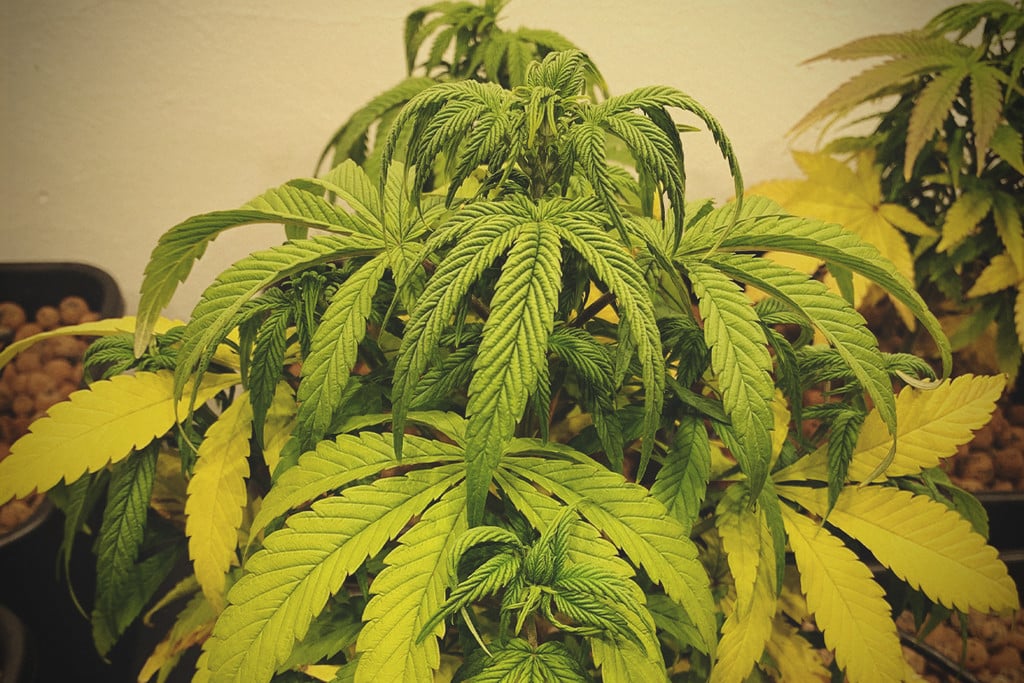 Weed Grow Guide by Royal Queen Seeds
Weed Grow Guide by Royal Queen Seeds
- Growing weed step by step
- Cannabis growing basics
- Choosing your seeds
- How to germinate seeds
- The cannabis vegetative stage
- The cannabis flowering stage
- Harvesting cannabis
- Trimming, drying, and curing
- Choosing pots and soil
-
Growing indoors
- A Complete Overview Of Growing Cannabis Indoors
- Cannabis Cultivation Tips: How To Set Up Indoor Grow Lights
- How Many Cannabis Plants Can You Grow Per Square Metre?
- Indoor Cannabis Growing: Relative Humidity and Temperatures
- Hydroponics Cannabis Growing Guide (with diagrams)
- Cannabis Micro Growing: Growing Great Weed in Tiny Spaces
- Growing outdoors
- How to grow autoflowering cannabis
- Cannabis nutrients and pH
- Cannabis troubleshooting: Nutrients
-
Cannabis troubleshooting: Growing
- Cannabis Seed Germination — Troubleshooting Guide
- How to Deal With Pythium (Root Rot) in Cannabis Plants
- Slow Cannabis Plant Growth And What You Can Do About It
- How to Deal With Leggy Cannabis Seedlings
- Watering Your Cannabis: How to Fix Overwatering and Underwatering
- Understanding Male, Female, And Hermaphrodite Cannabis
- Identifying and Treating Common Cannabis Ailments
- How To Revive a Sick Cannabis Plant
- How to Avoid Mouldy Weed During Drying and Curing
- How to Prevent and Treat Dry and Crispy Cannabis Leaves
- What Cannabis Leaves Can Tell You
- Causes and Solutions for Yellow Cannabis Leaves
-
Cannabis Strains Grow Report
- HulkBerry Automatic Grow Report
- Blue Cheese Auto Grow Report
- Purple Punch Automatic Strain Grow Report
- Triple G Automatic Grow Report
- Do-Si-Dos Automatic Grow Report
- Green Gelato Automatic Grow Report
- Haze Berry Automatic Grow Report
- Purple Queen Automatic Grow Report
- Cookies Gelato Automatic Grow Report
- Sherbet Queen Automatic Grow Report
- Sweet Skunk Automatic Grow Report
- Medusa F1 Grow Report
- Cannabis plant training
-
Weed growing tips
- The Cannabis Plant Anatomy
- How to preserve seeds - UK
- How Much Sunlight Do Outdoor Cannabis Plants Need To Grow?
- How to Control and Prevent Stretching in Cannabis Plants
- My Cannabis Plants Are Growing Too Tall: What Should I Do?
- Should You Worry About Purple Or Red Cannabis Stems?
- What To Do When Your Indoor Cannabis Won’t Flower
- How To Protect Your Cannabis Plants From Heat Stress
- How To Tell If Your Female Cannabis Plant Has Been Pollinated
- Growing Medical Marijuana
- Bud Washing: How to Clean Your Weed
- Understanding Cannabis Yield per Plant
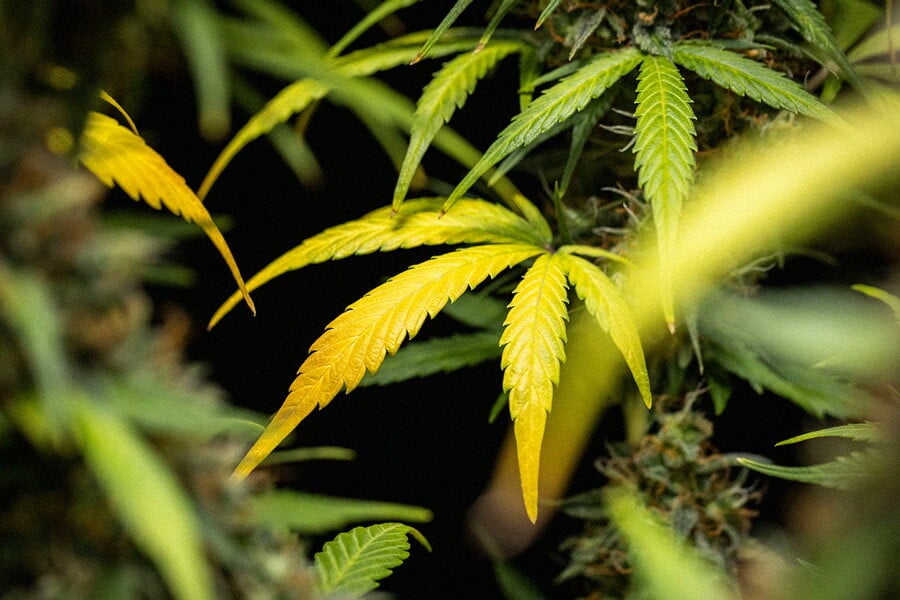
Causes and Solutions for Yellow Cannabis Leaves
Contents:
- Diagnosing yellow fan leaves in cannabis plants
- Common causes of yellow leaves in cannabis plants
- Yellow cannabis leaves across growth stages: seedling, veg, and flower
- When yellow leaves are normal: ageing and senescence in cannabis
- Yellowing cannabis leaves: the causes are myriad
- Faq: yellow weed leaves
We can help you to correctly identify the common causes of yellow cannabis leaves. Moreover, we can offer solutions for treating ailing plants, plus some simple pro tips and tricks. Any home grower can implement our advice to avoid cannabis leaves turning yellow. Now, let’s get into the specifics.
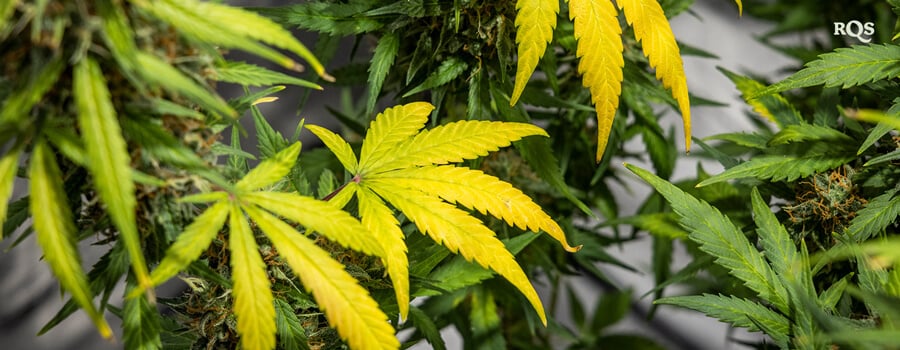
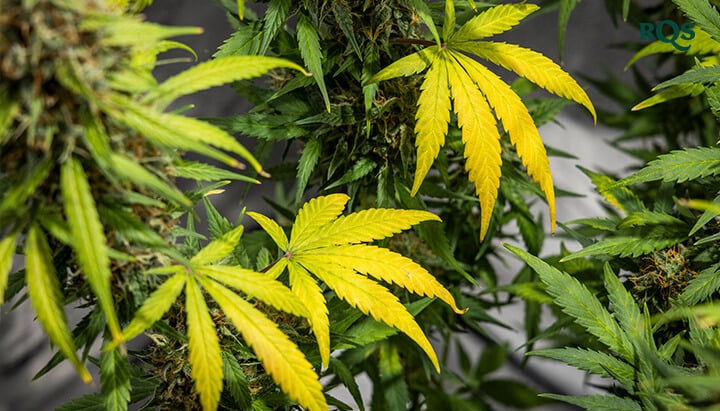
Diagnosing Yellow Fan Leaves in Cannabis Plants
The very first step is accurate diagnosis. What is the cause of fan leaves turning yellow during veg? Chlorosis, which occurs when leaves don't produce enough chlorophyll, causes foliage to turn from an alluring shade of green to a yellow hue. In order to effectively apply treatment, you must know what you’re dealing with. But there's no need to jump to conclusions or panic.
The leaves on your cannabis plants are like biological solar panels; they are essential to photosynthesis. Therefore, removing all the yellow leaves is not recommended, especially for young plants. Correct identification of the source of the problem and swift remedial action can restore your cannabis plants to full health. Yellow cannabis leaves can result from various factors, including nutrient deficiencies, watering issues, pH imbalances, light stress, environmental factors, and pest infestations. By carefully examining the symptoms, you can identify the root cause and implement the appropriate solution.
Make sure your plants stay healthy and strong! Download our Grow Guide for tips on optimising watering, nutrient management and more.
Free RQS
Grow Guide!
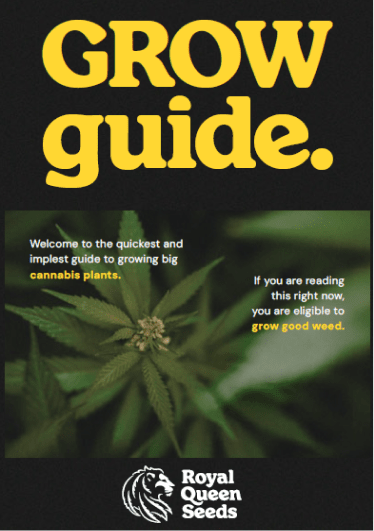
Common Causes of Yellow Leaves in Cannabis Plants
The causes of yellowing leaves can be attributed to two main categories: grower errors and environmental factors.
-
Grower Errors in Cannabis Cultivation Leading to Yellow Leaves
Many issues that cause yellow leaves stem from preventable mistakes caused by the grower (i.e. you) during cultivation. By identifying and addressing these human errors, you can correct the problems through various adjustments.
- Nutrient Deficiency in Fan Leaves
A lack of key nutrients will cause cannabis leaves to turn yellow and wilt. Nutrient deficiencies can interrupt cannabis growth and prevent plants from carrying out vital functions. Conversely, too many nutrients can cause nutrient burn, which also results in yellow leaves. The symptoms look unhelpfully similar, though there are differences.
Under-fertilisation causes leaves to turn from green to yellow and eventually collapse, whereas over-fertilisation causes leaves to become crunchy, vibrant yellow, and curly. As a key macronutrient for cannabis plants, nitrogen deficiency is usually the culprit behind this type of yellowing.
- Nitrogen deficiency: Starts by yellowing the edges of leaves before working its way inwards. The central veins of each leaf remain dark green throughout this process.
- Potassium deficiency: Causes yellowing at the edges and tips of leaves.
- Magnesium deficiency: Results in yellowing between the leaf veins.
Nitrogen burn, on the other hand, gives rise to toxicity, which manifests as shiny leaves that are much darker green than usual.
Solution: Ensure your plants receive a balanced supply of nutrients, especially during the vegetative stage. Organic seaweed fertiliser provides a broad spectrum of key nutrients that will help to rectify the condition. Follow the dosage instructions on the bottle. Consider using a balanced cannabis nutrient solution rich in essential elements like nitrogen, potassium, and magnesium. This can prevent deficiencies and promote healthy growth.
For a deeper dive into cannabis nutrition and practical tips on choosing the right fertilisers, explore our detailed guide on cannabis nutrients.
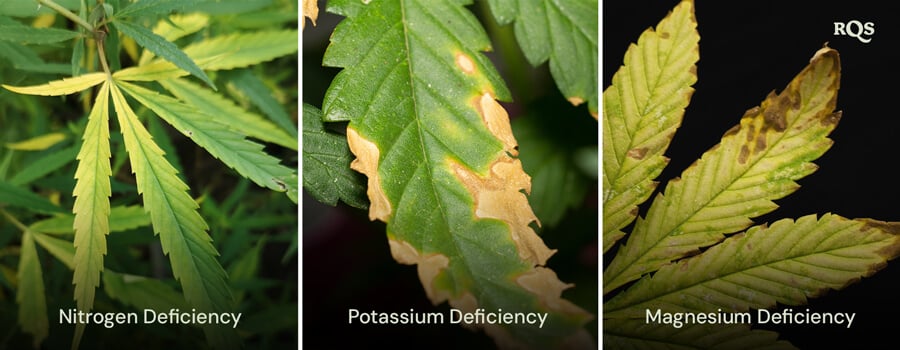
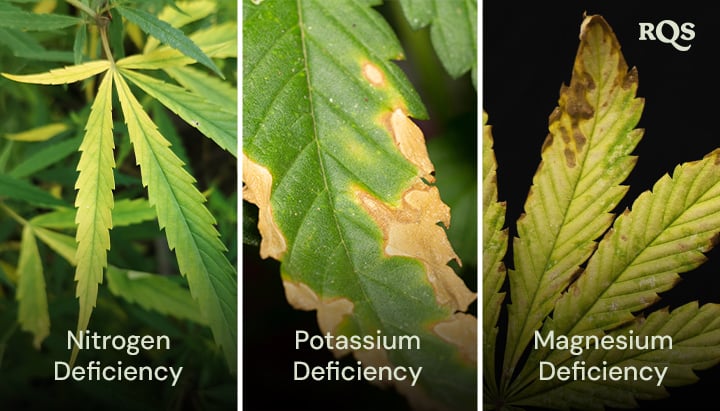
Cannabis plants will only thrive with an effective wet-dry cycle. This means you must water the right amount at the right time as consistently as possible. Of course, it doesn’t need to be perfect, but it should be stable and reliable. So what's the best way to tell if your marijuana is thirsty? Lift up the containers when they are dry, then again after watering, so you will know the difference. Alternatively, you can feel the topsoil. If it’s wet, the plants don’t need watering. If the first couple of centimetres have dried out, it’s time to water.
Overwatering causes leaves to appear swollen and yellow due to excess moisture. Too much water can lead to root rot. Overwatered cannabis plants will display leaves that are droopy and may develop yellowing leaves due to a lack of oxygen to the roots. Underwatering, on the other hand, leads to dry, brittle, and yellowing leaves.
Solution: Monitor the plant's post-watering behaviour closely, and use one of the measures above to accurately gauge when to water to prevent any issues. You can also use moisture meters to check soil dampness. Establish a consistent watering schedule, and allow the top inch of soil to dry out between waterings.
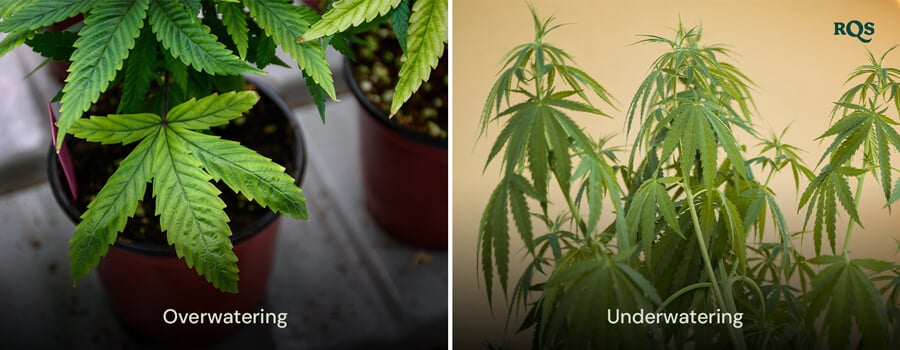
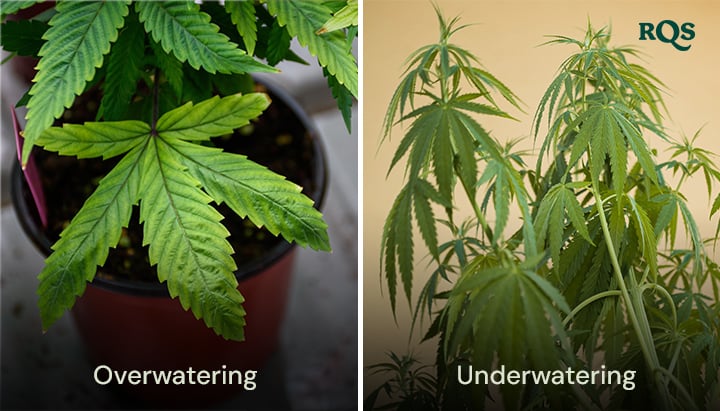
Soil growers have the advantage of cultivating in a medium that acts as a buffer for roots. Hydroponics and coco are not quite as forgiving to pH imbalances. Even soil growers need to at least come close to achieving the ideal pH of 6.0–7.0 and maintain it; otherwise, plants will suffer.
Essentially, when the pH of your nutrient solution strays above or below the particular sweet spot for your substrate, it prevents complete absorption of all the elements of the solution. Roots are starved of certain nutrients and micronutrients as the incorrect pH causes a lockout.
Solution: Invest in a pH pen or cannabis fertilisers with pH-perfect solutions that can auto-adjust a wider pH range. Flush plants with pure water and then resume feeding with a light dialled-in solution to suit your growing medium. Also, make sure that the base nutrients you use contain all of the essential micro-elements, or you will have to add extra bottles of supplements to the budget.
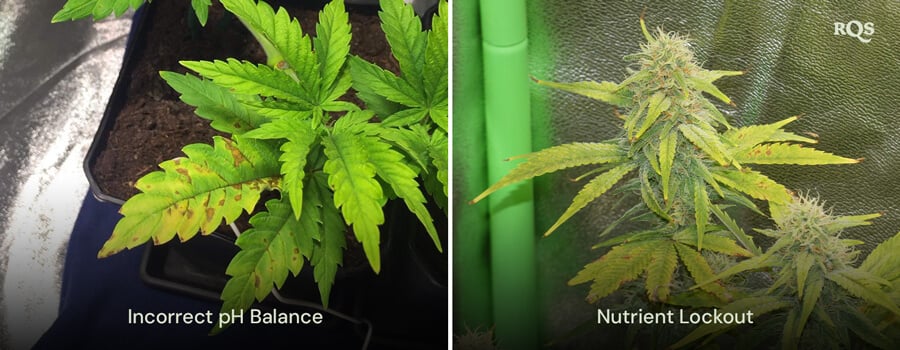
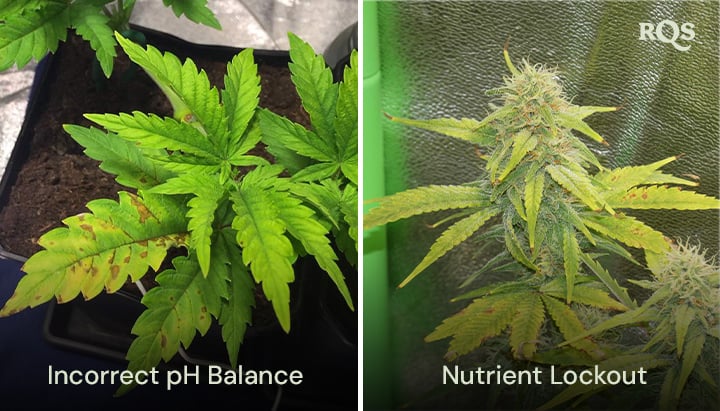
-
Light Stress on Cannabis Leaves
Indoor cannabis plants grown under artificial lights must be perfectly positioned, and lamps must be at just the right distance above the canopy for best results.
- Light burn: When lamps and reflectors are too close to the flowering tops, buds and leaves will turn yellow and brown as the light is too intense. This is very much a top-down problem.
- Light deficiency: Too little light is usually a problem that is most evident from the bottom up. Light deficiency causes shaded leaves, which will eventually yellow and drop off if they don't receive sufficient light penetration.
Solution: Make sure to hang your grow lights as per the manufacturer’s instructions. Adjust as plants progress and use a tape measure for precision. Ensure even light distribution and monitor plants regularly for signs of light stress.
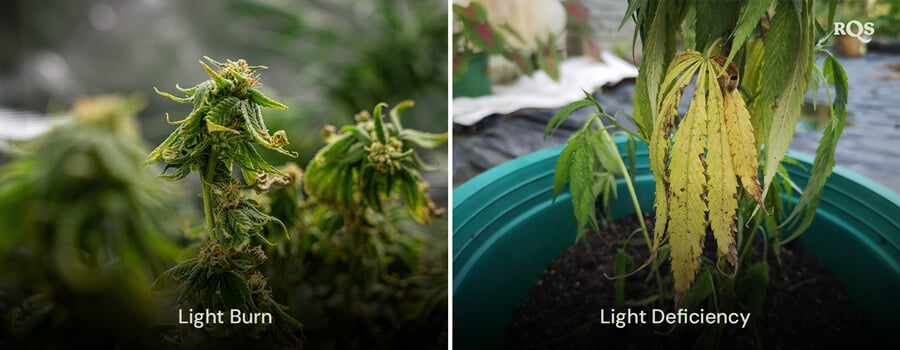
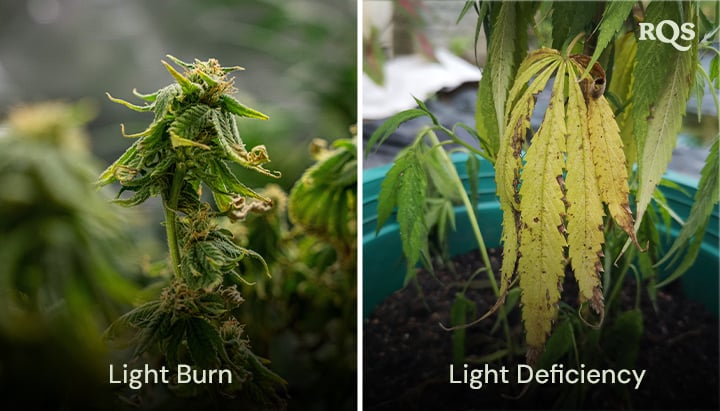
-
Environmental Factors Causing Yellowing in Cannabis Leaves
External conditions can also lead to yellow leaves. These factors include climate and pest issues, which growers may not directly control but can manage. Here are some potential environmental reasons for yellowing leaves as well as actionable tips to control and mitigate these influences.
Yellow leaves are a key sign of root rot, a microbial condition that attacks the root system of plants. When the growing medium becomes too damp from excessive moisture or overwatering, it becomes a breeding ground for fungi, bacteria, and algae. Any of these organisms can begin to attack the roots in these conditions and cause them to start rotting. This leads to yellowing leaves, brown and slimy roots, leaf drop, and an overall droopy and withered look.
Solution: There are several ways to combat root rot once it sets in. Start by introducing beneficial microbes, such as mycorrhizal fungi, into the soil to fight the bad guys. Next, you’ll want to take a look at your watering schedule. Hold back on feeding and flush the growing medium with pure water. Then you can continue feeding according to the instructions on your chosen product.
Consider transplanting affected specimens into fabric pots or Air-Pots to increase aeration and boost drainage. Add a heavy dusting of mycorrhizal fungi to the growing medium mid-way through the transplant for best results.
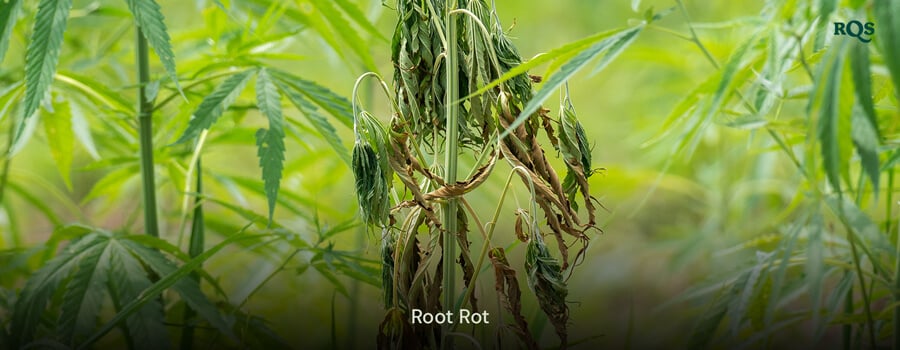
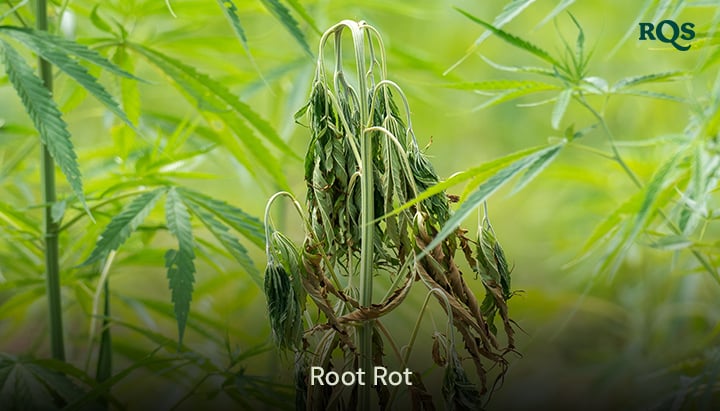
-
Leaf Septoria: Identifying and Treating Fungal Infections
As a prolific fungal disease, leaf septoria often leads to yellow cannabis leaves. This pathogen strikes the leaves of several plant species—cannabis, tomatoes, parsley—where it first presents as black spots. As the disease spreads, these spots swiftly spread from leaf to leaf and cause brown spots, yellowing, and wilting.
Leaf septoria usually ramps up during the early flowering phase. Left untreated, the pathogen can destroy a large amount of foliage. Because cannabis plants depend on their fan leaves to fuel growth and create energy, excess damage can lead to stunted growth and reduced harvests.
Solution: First things first, you’ll need to remove the infected foliage. Clean your pruning scissors and carefully cut away any leaves that display signs of leaf septoria. Removing infected fan leaves will help to prevent the spread, but finishing the treatment with a dose of neem oil foliar spray will help to take out any non-visible traces of the pathogen.
After treating your plants, you should tweak a few environmental factors to prevent leaf septoria from returning. Start by improving air circulation around infected plants. Add fans to your growing room and instal a dehumidifier if your growing space tends to become extremely moist. Outdoors, move your containers to slightly higher ground to expose plants to the wind.
Clean up the base of your plants. Remove any dead foliage that might be carrying spores and add a fresh layer of mulch to prevent spores from making their way into the soil.
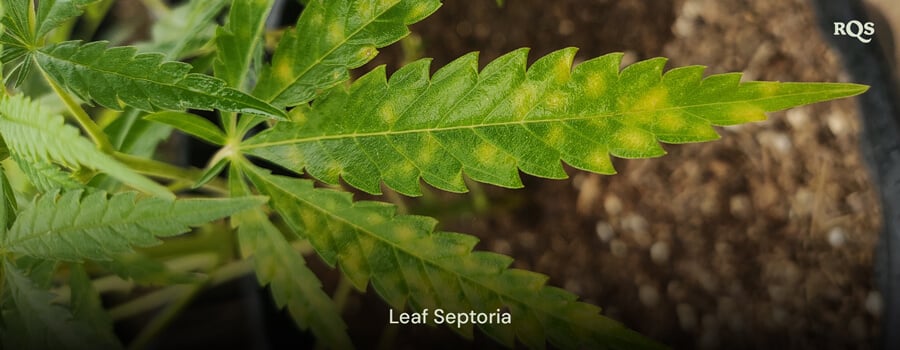
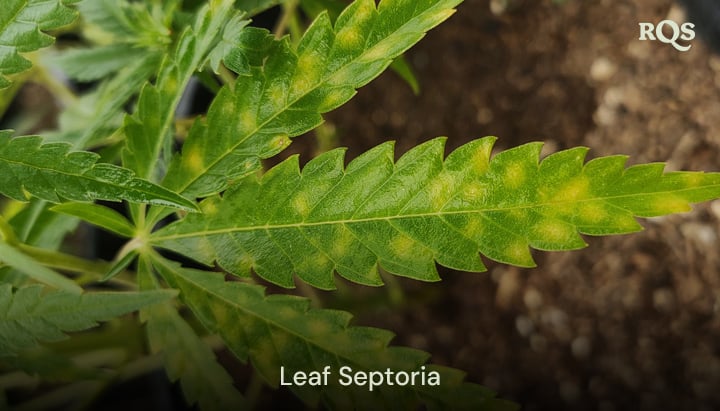
-
Temperature Stress: Effects of Cold and Heat on Leaf Health
Cold weather: Temperatures below 10°C will cause the leaves of cannabis plants to yellow. Some will even take on purple and bluish tones. Sure, this is a fantastic bonus in the final phase of bloom with some strains, but should be avoided early on in the grow.
Heat waves: Heat waves can cause cannabis plants' leaves to yellow and dry out indoors and outdoors. Temperatures above 28°C prevent cannabis plants from efficiently photosynthesising and cause buds to form more loosely and airy.
Solution: Indoors, simply turn up the heat or add more lights to the grow-op and turn a negative into a bumper harvest. Use heaters or cooling systems to maintain optimal indoor temperatures. Outdoor growers might need to take plants inside at nighttime or at least invest in a basic DIY greenhouse. Employ shade cloths or mulches for outdoor plants. Monitor temperature levels regularly.
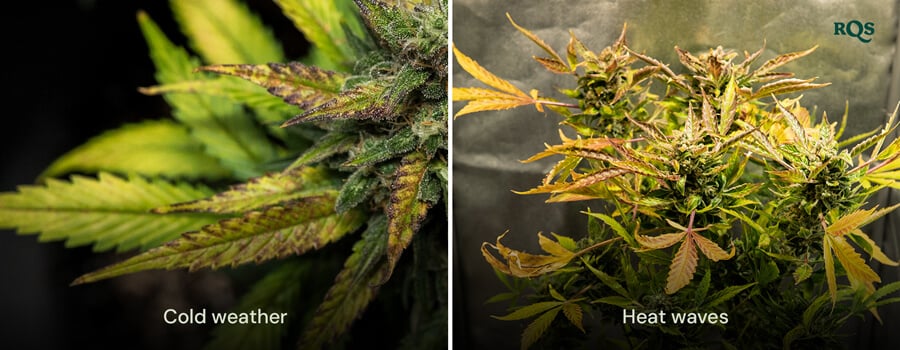
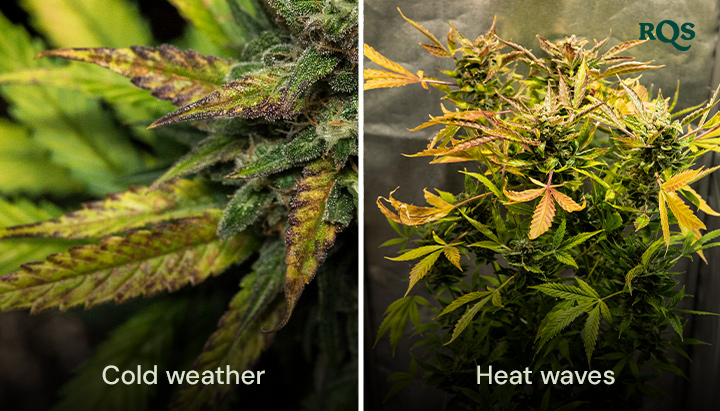
-
Pest Infestations and Disease Control
Humans aren’t the only life form with a love for cannabis. Many other creatures—large and microscopic—love to chow down on the herb. Pests like spider mites and thrips can cause yellowing through feeding damage. Fungal pathogens and nematodes often assault the roots, whereas thrips and fungus gnats have developed a taste for succulent weed leaves. Larger animals also take interest in the herb's earthy tastes, from roaming deer to household pets.
Solution: Growers need to make sure they do everything possible to protect their crop from pests and disease. Implement integrated pest management (IPM) strategies, including introducing predatory species into your garden and cultivating companion plants that repel these pests. Use natural insecticides like neem oil or insecticidal soaps. Regularly inspect plants for signs of pests.
Erect fences and mesh netting to stop deer, birds, and pets from having their way with your weed plants. If your insect problem spirals out of control and you start to come across eggs, apply a foliar spray of neem oil to clean up your crop.
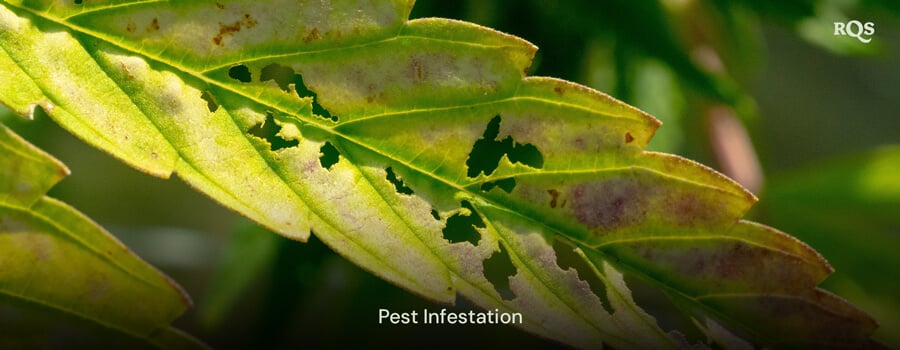
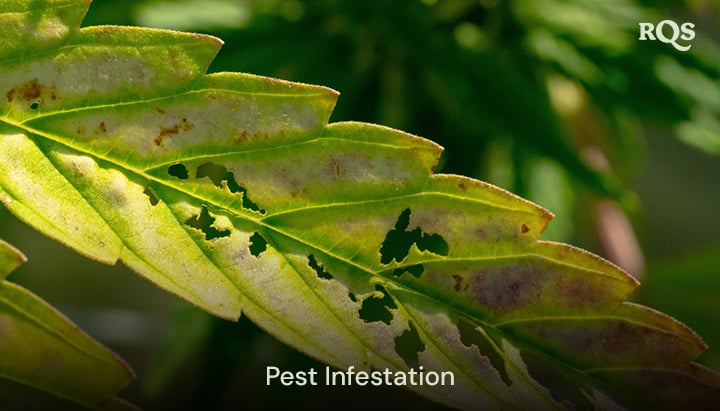
Yellow Cannabis Leaves Across Growth Stages: Seedling, Veg, and Flower
Yellowing can occur at different growth stages, and understanding these patterns helps in making a proper diagnosis. Here we explain the occurrence of yellowing leaves throughout the grow cycle, with a focus on the veg and flowering stages, detailing when yellowing might occur as a normal sign of growth versus the result of problematic conditions.
-
Yellowing in Seedling Stage: Causes and Quick Fixes
During the seedling stage, plants are particularly vulnerable.
Yellowing at this stage can be due to nutrient burn from over-fertilisation or overwatering, leading to root issues. Seedlings require very mild nutrient solutions, if any at all.
Solutions:
- Use a mild nutrient solution suitable for seedlings.
- Ensure proper drainage and avoid overwatering.
- Reduce nutrient strength and adjust watering practices for young plants.
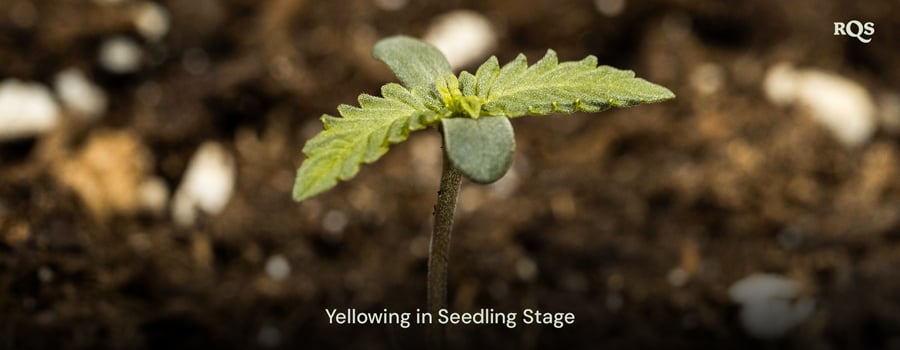
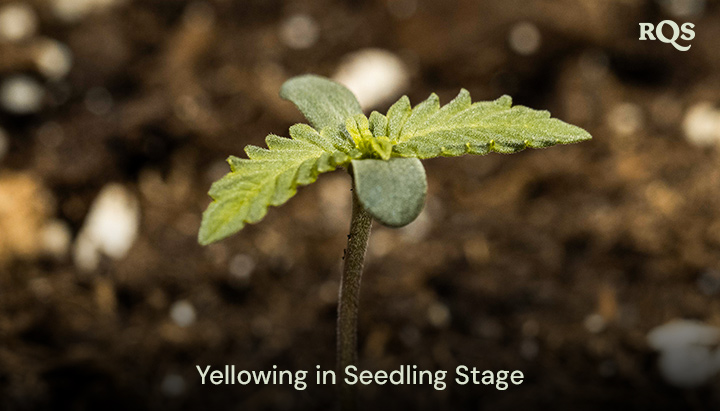
-
Fan Leaves Turning Yellow During Veg Stage: What to Know
The vegetative stage is critical for the development of a robust plant structure.
Nutrient requirements are high during veg, and to achieve optimal growth you must account for this. Nevertheless, it's always better to slightly underfeed than overfeed. Stress factors like nutrient deficiencies, overwatering, or pests can significantly impact growth.
Solutions:
- Maintain a balanced feeding schedule with appropriate nutrient ratios, and, preferably, use organic feeding methods to avoid overfeeding.
- Monitor for pests and diseases.
- Adjust environmental conditions as needed to ensure optimal growth.
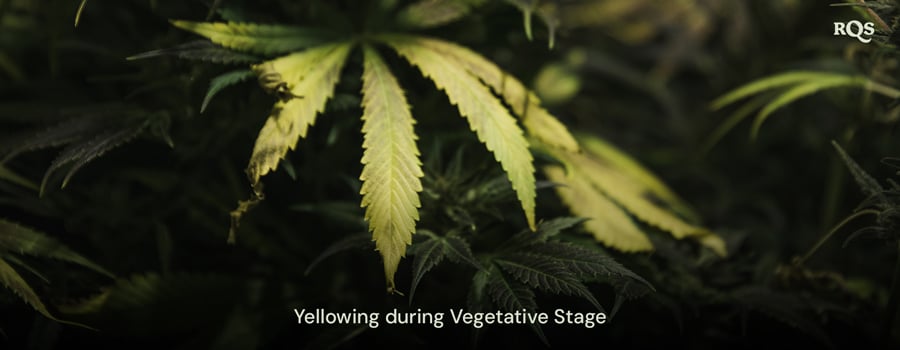
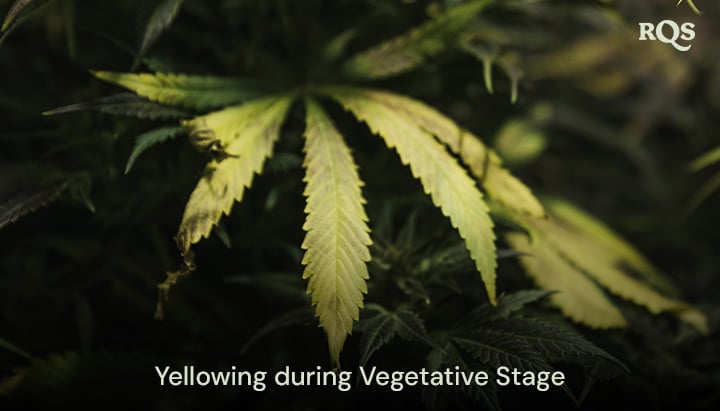
-
Yellowing Leaves During Flowering: Prevention and Treatment
During flowering, plants focus energy on bud development.
It's important to distinguish between normal yellowing due to senescence and nutrient deficiencies. Senescence is the natural ageing process where plants redirect energy to buds, causing older leaves to yellow. Excessive yellowing may indicate issues that need attention.
Solutions:
- Provide proper nutrient ratios for flowering, ensuring that plants receive adequate phosphorus and potassium.
- Monitor for signs of pests or diseases.
- Don't worry about senescence!
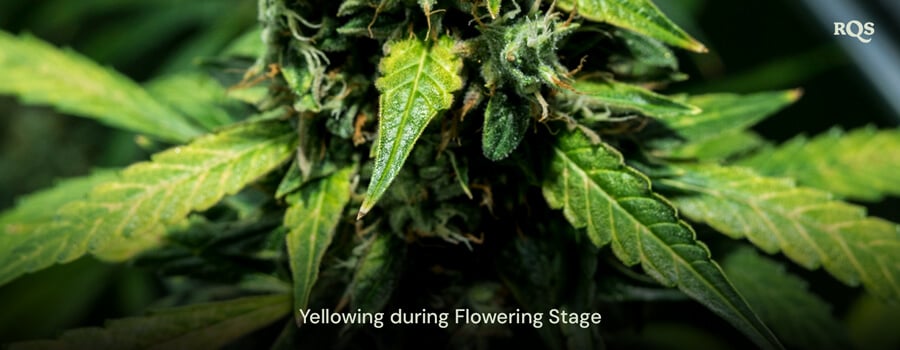
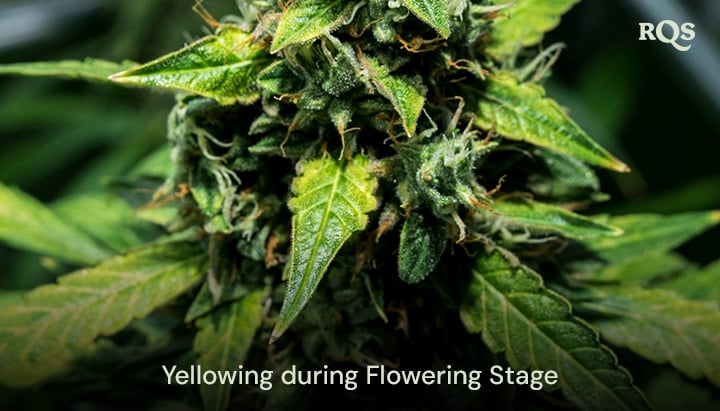
When Yellow Leaves are Normal: Ageing and Senescence in Cannabis
Sometimes, growers don’t need to worry about yellow leaves. At times, they are merely a natural part of the growing cycle. Cannabis plants often shed older fan leaves (especially at the end of their life), which turn yellow before falling to the ground.
During the flowering phase, plants divert most of their energy towards the flowers, which also tends to cause slight yellowing of the leaves. Flushing towards the end of the flowering phase will also cause leaves to turn yellow and fall from their branches. This intentional restriction of nutrients has the potential to make cannabis flowers taste much better.
Senescence is a natural plant life cycle process, particularly in late flowering. As this is normal, no action is needed so long as the plant is otherwise healthy. You can relax!
Should You Cut Off Yellow Leaves in Cannabis Plants?
Removing yellow leaves can improve airflow, light penetration, and reduce pest risks, but be cautious not to over-prune, as this can stress the plant. For best results, remove only leaves that are fully yellow and perhaps starting to wilt. Also, to avoid infection at this late stage, use clean tools to prevent the spread of disease.
Yellowing Cannabis Leaves: The Causes Are Myriad
Yellowing leaves are a common issue, but they can often be corrected with proper care. By accurately diagnosing the cause—whether it's a nutrient deficiency, watering problem, pH imbalance, light stress, or something else—you can take effective steps to restore your plants' health. Regular monitoring and preventive measures will help you maintain a thriving cannabis garden.
Understanding why your marijuana leaves are turning yellow is crucial for a successful harvest. By following the guidance provided, you can address issues promptly and ensure your fan leaves remain vibrant during the vegetative stage.
FAQ: Yellow Weed Leaves
Below, find answers to some common question about yellowing leaves on cannabis plants.
- Will Yellow Leaves Turn Green Again on My Cannabis Plant?
- Unfortunately, once a leaf has turned yellow due to nutrient deficiencies or stress, it typically won't return to green. Focus on correcting the underlying issue to prevent further yellowing. Healthy new growth is a sign that the plant is recovering.
- How to Treat Yellow Leaves on a Cannabis Plant?
- Identify the root cause of yellowing—be it nutrient deficiencies, pH imbalances, pests, or environmental stress—and apply the appropriate remedy, such as adjusting nutrient levels or eradicating pests. Ensure consistent care and monitor your plants closely.
- Why Are My Fan Leaves Turning Yellow and Purple?
- This could be a sign of temperature stress, particularly exposure to cold temperatures, or a phosphorus deficiency. Ensure your plants are kept within optimal temperature ranges and adjust nutrient concentrations as necessary. Some strains naturally exhibit purple hues in cooler temperatures.
- What Causes Yellow Spots on Cannabis Leaves?
- Yellow spots can result from pest infestations like spider mites or fungal infections like leaf septoria. Regularly inspect your plants and consider using natural pesticides or fungicides. Improving air circulation can also help prevent fungal issues.
- Is Yellowing During the Flowering Stage Normal?
- Yes, some yellowing is normal during the late flowering stage as the plant redirects energy to bud development. However, excessive yellowing may indicate issues like nutrient deficiencies that need attention.
- Should I Cut Off Yellow Leaves on My Cannabis Plant?
- Removing yellow leaves can improve airflow and reduce the risk of pests, but be careful not to prune excessively. Remove only fully yellow leaves that come off easily.
- What Can I Do if My Cannabis Leaves Are Turning Yellow From Nutrient Deficiencies?
- Adjust your feeding regimen to address the specific deficiency. If you’re experiencing yellow leaves from nutrient issues, consider nutrient boosters like Easy Boost Nutrition, which provides a balanced mix of essential nutrients tailored for cannabis growth.
 Grow Guide Topic Finder
Grow Guide Topic Finder
- Growing weed step by step
- Cannabis growing basics
- Choosing your seeds
- How to germinate seeds
- The cannabis vegetative stage
- The cannabis flowering stage
- Harvesting cannabis
- Trimming, drying, and curing
- Choosing pots and soil
-
Growing indoors
- A Complete Overview Of Growing Cannabis Indoors
- Cannabis Cultivation Tips: How To Set Up Indoor Grow Lights
- How Many Cannabis Plants Can You Grow Per Square Metre?
- Indoor Cannabis Growing: Relative Humidity and Temperatures
- Hydroponics Cannabis Growing Guide (with diagrams)
- Cannabis Micro Growing: Growing Great Weed in Tiny Spaces
- Growing outdoors
- How to grow autoflowering cannabis
- Cannabis nutrients and pH
- Cannabis troubleshooting: Nutrients
-
Cannabis troubleshooting: Growing
- Cannabis Seed Germination — Troubleshooting Guide
- How to Deal With Pythium (Root Rot) in Cannabis Plants
- Slow Cannabis Plant Growth And What You Can Do About It
- How to Deal With Leggy Cannabis Seedlings
- Watering Your Cannabis: How to Fix Overwatering and Underwatering
- Understanding Male, Female, And Hermaphrodite Cannabis
- Identifying and Treating Common Cannabis Ailments
- How To Revive a Sick Cannabis Plant
- How to Avoid Mouldy Weed During Drying and Curing
- How to Prevent and Treat Dry and Crispy Cannabis Leaves
- What Cannabis Leaves Can Tell You
- Causes and Solutions for Yellow Cannabis Leaves
-
Cannabis Strains Grow Report
- HulkBerry Automatic Grow Report
- Blue Cheese Auto Grow Report
- Purple Punch Automatic Strain Grow Report
- Triple G Automatic Grow Report
- Do-Si-Dos Automatic Grow Report
- Green Gelato Automatic Grow Report
- Haze Berry Automatic Grow Report
- Purple Queen Automatic Grow Report
- Cookies Gelato Automatic Grow Report
- Sherbet Queen Automatic Grow Report
- Sweet Skunk Automatic Grow Report
- Medusa F1 Grow Report
- Cannabis plant training
-
Weed growing tips
- The Cannabis Plant Anatomy
- How to preserve seeds - UK
- How Much Sunlight Do Outdoor Cannabis Plants Need To Grow?
- How to Control and Prevent Stretching in Cannabis Plants
- My Cannabis Plants Are Growing Too Tall: What Should I Do?
- Should You Worry About Purple Or Red Cannabis Stems?
- What To Do When Your Indoor Cannabis Won’t Flower
- How To Protect Your Cannabis Plants From Heat Stress
- How To Tell If Your Female Cannabis Plant Has Been Pollinated
- Growing Medical Marijuana
- Bud Washing: How to Clean Your Weed
- Understanding Cannabis Yield per Plant


























